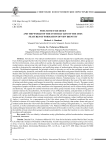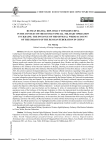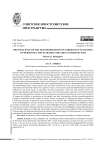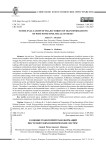Советское и постсоветское пространство. Рубрика в журнале - Вестник ВолГУ. Серия: История. Регионоведение. Международные отношения

Статья научная
Introduction. The radical transformations of recent decades have significantly changed the lives of ethnic groups like the Udis. Due to their small numbers and poor degree of protection, ethnic groups are the first to feel tension, crises, and conflicts in society, the sequelae of political, social, economic, and cultural modernization, and growing risks and threats in the global world. Methods. The systematic method made it possible to determine the contradictory and conflicting nature of modernization taking place in post-Soviet societies. The dialectical approach, the principle of unity in diversity, as well as the synergetic approach have revealed ambiguity, dynamism, and conflict in the emergence of both ethnic and general cultural identity. Analysis. Studies of the real state of post-Soviet societies have shown the unbalanced and diffuse nature of modernization, the ambiguity of the present, and uncertainty of the future. Considering the Volgograd region, the authors point out relatively stable interethnic and interdenominational relations. Simultaneously, it was revealed that the absence of a national ideology and common objectives and values problematize the issues of the joint existence of nations and ethnic groups, and hamper the search for a common cultural identity. Results. The paper reveals the complex nature of the dynamics of heterogeneous Russian society and the inadequacy of calls for unity and integration of peoples while the society continues to be fragmented, polarized, and its citizens being alienated and atomized. The agenda for national minorities and ethnic groups includes issues of determining genuine national interests by the authorities, the formation of an all-Russian identity, and patriotism as the basis of stability and sustainable development of the country. The complex environment of social communication is replete with various multifaceted processes and influences that will allow representatives of ethnic groups to become carriers of common rules, common moral norms, and cultural meanings, values, traditions and customs. Authors’ contribution. As a representative of the Udis ethnic group, R.A. Danakari considered the socio-political existence of his native ethnic group. The author argues convincingly that modern forms and types of modernization destroy the “life world” and traditions of most Udis, leading to marginalization, i.e., loss of origins and roots, as well as assimilation and acculturation. V.Yu. Podurueva-Miloevich focused on the political dynamics and psychological characteristics of the rapid transformation of the modern world. As a result, the author reveals the inability of most minor ethnic groups to adapt to postmodernity, to make the transition to a new identity, and to achieve self-realization.
Бесплатно

Статья научная
Introduction. Digital diplomacybased on cutting-edge information and communication technologies is playing an increasingly major role and is gradually becoming an important tool in boosting traditional public diplomacy by providing information and public opinion support for the implementation of the country's foreign policy abroad. The Embassy of the Russian Federation in China has been actively engaged in digital diplomacy on the Chinese social media platform Sina Weibo, aiming to put an end to the “public opinion hegemony” of the Western media and counter fake news and negative propaganda from Ukraine and other countries about the Special Military Operation. Methods and materials. This paper is built on a streak of official interviews with diplomats at the Embassy of the Russian Federation in Beijing. Drawing on content analysis of the microblogs published by the official account of the Embassy of the Russian Federation in China from January 1, 2022 to April 1, 2023, this article examines the digital diplomacy of the Russian official institutions regarding China against the background of the Russian Special Military Operation in Ukraine. Analysis. Russia's digital diplomacy towards China has been focusing strongly on the Special Military Operation. In the field of digital diplomacy with China, two main information sources have arisen that are represented by the Russian Embassy in China and two mainstream media outlets, Russia Today and Sputnik. They advocate steadfastly for Russia's national interests and express its official stance. In terms of content and topics, the Russian Embassy's Weibo diplomacy with China is overwhelmed by the political issues following the Special Military Operation, that emphasize the official position of Russia and explains the objectives of the Special Military Operation - to disarm and control the foreign forces used against the people of Donbas and to stop neo-Nazism and its ideology. In terms of communication methods, the Weibo operations team of the Embassy of the Russian Federation in China has demonstrated its professionalism and aptitude to market events while using such unique Weibo functions as the hashtagging events feature. Results. The target audience's attention to a hot issue is time-sensitive, i.e., about one month after the event, which is the “golden stage” for effective digital diplomacy. At the same time, the study illustrates that while carrying out digital diplomacy activities with China, the Russian Embassy in China still has shortcomings in its performance, i.e., in early 2023, the official position was over-highlighted and the content and form of communications were relatively homogeneous. The content of communication should be appropriately enriched in order to eventually build up a multi-faceted and multi-angle communication system.
Бесплатно

Статья научная
Introduction. The article outlines transformations in Uzbekistan’s economy during the Great Patriotic War, the emergence of problems related to personnel as a result of these changes, the main causes of the lack of staff, and measures to prevent this shortage and their effectiveness. The given study analyzed the organizational problems of providing the economy with employees, analyzed measures taken during the Great Patriotic War to meet the demands of the country’s economy for personnel, and obtained new data dealing with the social status of human resources. Methods and Materials. A wide range of archival sources from the funds of the National Archive of Uzbekistan that weren’t published earlier was used in the preparation of the article. The methodological basis of the research is the principle of historicism. In the course of the study, historical-comparative and statistical methods were applied. Analysis. The research conducted identified factors related to productivity and social issues. In particular, the labor productivity of the new staff (mainly women and adolescents) replacing qualified personnel who went to the war front has been analyzed; on the other hand, the impact of the working process on their social lives has been considered. During the war years, the involvement of women and children in production in the republic and their relationship with the evacuated population resulted in significant positive trends in society. Results. In general, by studying the impact of changes in Uzbekistan’s economy on personnel issues during the Great Patriotic War, valuable information about various sectors of the Republic’s economy during the war years as well as the advances and defects in different economic branches was obtained. Authors’ contribution. Kh.B. Babadjanov and A.K. Abdullayev jointly studied archival materials and scientific literature and drew conclusions on the topic. Kh.B. Babadjanov analyzed the documents of the National Archive of Uzbekistan, which made it possible to explore the peculiarities of the transformation of the economy of Uzbekistan during the Great Patriotic War and the supply of it with personnel. A.K. Abdullayev participated in the analysis of statistical and economic data.
Бесплатно

К оценке траекторий трансформаций постсоветских политических систем
Статья научная
Введение. В статье рассмотрено становление и развитие политических систем одиннадцати бывших республик СССР с точки зрения происходивших в них институциональных преобразований, борьбы за власть между различными элитными группировками и динамики идентичности граждан. По мнению авторов, выделенные параметры позволяют наиболее эффективно произвести сравнение и типологизацию развития современных постсоветских политий. Методы и материалы. При проведении исследования использовались неоинституциональный, социологический и политико-культурологический подходы, сравнительно-исторический и сравнительно-типологический методы, позволившие проанализировать имеющиеся факты и сделать соответствующие выводы. Анализ. В ходе исследования было установлено, что, начиная с середины 1980-х гг., трансформация типичных советских республик происходила в двух направлениях. Первым направлением стало формирование электоральных автократий, институциональный дизайн, социальный и культурный облик которых был определен «ядром» - президентом-лидером. Такая политическая динамика оказалась присуща Туркменистану, Таджикистану, Казахстану, Узбекистану, Азербайджану и Беларуси. Вторым направлением развития стало складывание фасадных демократий, характеризующихся институциональной, социальной и идентификационной фрагментацией, скрывающейся за витринами заимствованных на западе демократических структур и практик. Этот путь проделали Киргизия, Грузия, Армения, Украина и Молдавия. Результаты. По заключению авторов, как первый, так и второй типы политических систем не обеспечивают стабильного развития новых независимых государств в обозримом будущем. Вклад авторов. А.В. Абрамовым была сформулирована концепция статьи, разработаны параметры сравнения, проведено исследование борьбы за власть и эволюции идентичности постсоветских элит и граждан. Р.А. Алексеев проанализировал трансформацию политических институтов постсоветских политических систем в свете происходящих в них конституционных преобразований.
Бесплатно

